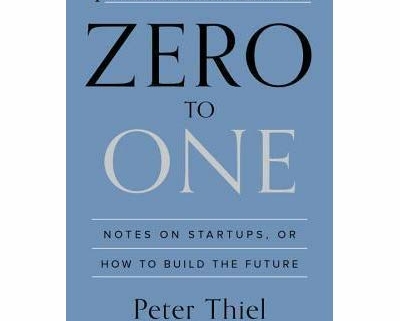Zero to One BOOK Summary
SYNOPSIS
Tap into a new way of thinking about business and ambition by reading this book summary. Zero to One will challenge you to think for yourself on topics such as technology verus globalization, business monopolies versus competitive markets, and the mindset you really need to make a difference in the world. Learn from tech superstar Peter Thiel (PayPal, Palantir) and his protégé Blake Masters why the only opportunities really worth pursuing are those that create something truly unique – that go from “zero to one” rather than from “one to n.” And, learn the seven questions you should be asking yourself to find out if what you’re working on passes that test.
TOP 20 INSIGHTS
- Creating truly innovative technology requires progressing from “zero to one” rather than from “one to n.” This means creating something entirely new rather than incrementally adding to what already exists.
- One way to move from “one to n” is globalization, or enabling new markets to access something that has already been created. But, because resources are not infinite, globalization needs to be accompanied by new technologies to make the consumption of goods more efficient and sustainable, or else global ills will result.
- The world needs startups as an engine to both envision and create the future. Though there has been new technology lately, there are still many aspects of everyday life that are begging for improvement, given the right vision and strategy.
- The dot-com crash of the 1990s taught entrepreneurs lessons about how to build a business that, when followed today, hinder the development of real technological innovations and sustainable growth. These “rules” should be ignored.
- Monopolies generate good for the world. If a business has achieved a monopoly, it indicates that the business has truly gone from “zero to one,” and created something for society that did not exist before or improved upon an existing technology to such a degree that it has made the old technology obsolete.
- To create this sort of change it is helpful to be a “definite optimist” – someone who believes that “the future will be better than the present if he plans and works to make it better.” This kind of worldview enables the vision, gumption, and persistence to go from zero to one.
- Monopolies also generate good for the world because of the privilege that major profits allot. “Since [Google] doesn’t have to worry about competing with anyone, it has wider latitude to care about its workers, its products, and its impact on the wider world.”
- Monopolies are more ubiquitous than we’re led to believe and shape their stories to avoid scrutiny and regulation. For example, if Google is seen primarily as a search engine company, they own 68% of that market. In contrast, if they’re described as playing in the global advertising market, they only own 3.4%.
- Monopolies are only bad when a business lingers in that position unchallenged for too long. Ideally, new monopolies take over, “adding entirely new categories of abundance to the world.” (Think of how Apple’s “mobile computing” replaced Microsoft’s hold on the PC market, who itself supplanted IBM’s “hardware monopoly” of the 1960s and 1970s.)
- The key to creating a monopoly is to resist copying others’ business models and instead to think for yourself. Prioritize four aspects of your business over a hyper-focus on growth: proprietary technology, network effects, economies of scale, and branding.
- Rather than initially painting a grandiose vision of global market dominance, the best way to build a monopoly is to start small. Capture a small, specific market with the tentacles to easily branch to related markets over time.
- Know that venture capital firms typically make their money by finding the one single startup that will outperform all their other investments. The bar really is that high for your pitch.
- The one single startup that will outperform all the others in a VC’s firm’s portfolio has solved a previously unaddressed problem or need in the world. In other words, they have unearthed and solved a “secret.” The good news is that, despite common knowledge, there are many secrets left to find and solve.
- The foundation you set for your startup is disproportionally important to the success of your company. The most crucial aspects to get right are related to personnel – selecting your co-founder and board.
- Offering equity as a form of compensation can be a good way to weed out those who lack the long-term commitment to and passion for the vision of your venture.
- The CEO of a startup should either receive the lowest salary at the company (and set an example of frugality) or the highest salary at the company (setting a maximum compensation), though if high it should be modest. If not, he or she risks getting too comfortable.
- While the fundamental innovation your business offers is crucial, sales and distribution tactics are necessary too. Sales acumen is a key distinguisher between success and failure. “Whatever the career, sales ability distinguishes superstars from also-rans.”
- Humans have nothing to fear from technology’s increasing presence in the marketplace. Instead, technology will create more opportunities for humans to do what they are uniquely good at, while the machine fills in the gaps by doing what is difficult for humans.
- Because it requires a distinctive vision to go from zero to one, successful founders are often eccentric individuals not afraid to pursue a seemingly eccentric vision. This explains both why founders are so successful and also why they can become scapegoats for corporate dysfunction.
- You don’t have to be the founder of a brilliant company to benefit from this knowledge. As an employee, search for these qualities in the companies and leaders you work for to ensure you have the right support to develop and to keep exploring new ideas.
SUMMARY
Zero to One is about the value of true innovation made accessible to the masses through startups. It outlines several tenets that keen-minded business people should hold dear, including why technology trumps globalization, why we should be supporting monopolies instead of “healthy competition,” why successful innovators have the worldview of a “definite optimist,” and why no one should be afraid of losing their job to a robot. Zero to One also delivers unique business insights, such as the four most important things to pay attention to about your product (hint: they’re not quantitative) and the seven questions every business must answer for itself.

